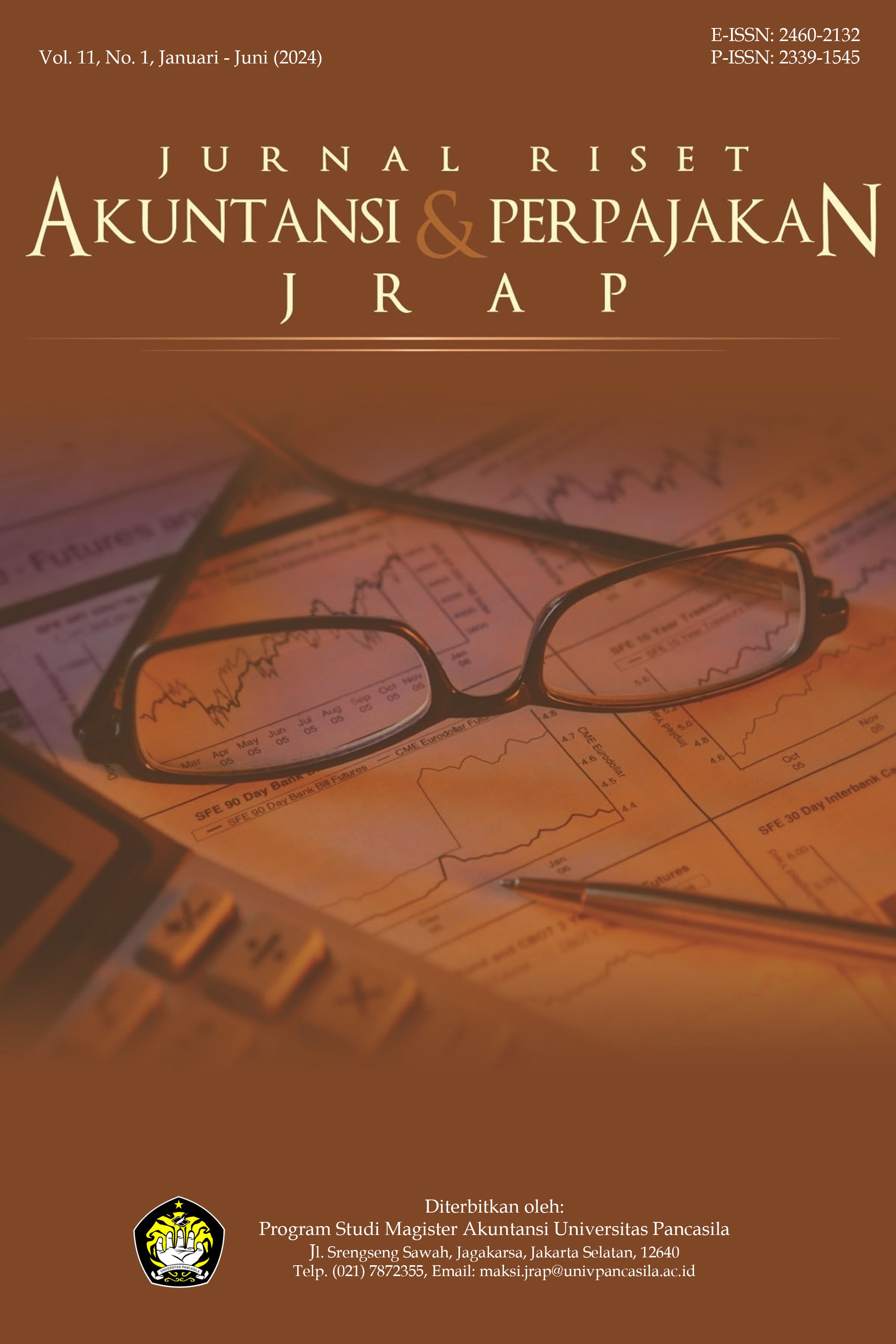Peran Literasi Keuangan, Risk Tolerance, Overconfidence Serta Financial Technology dalam Mendorong Keputusan Investasi
Abstract views: 1266 | Download Pdf downloads: 1469
Abstract
This research explores the roles of financial literacy, risk tolerance, overconfidence, and financial technology in investment decision-making. The conceptual framework is grounded in prospect theory, particularly in the context of investment decisions. A quantitative research method using a questionnaire was employed to collect primary data from an active student sample of the Faculty of Economics and Business at Universitas Muhammadiyah Surakarta. A total of 110 participating students served as research respondents. The collected data were processed and analyzed descriptively and inferentially. The research results indicate that financial literacy, risk tolerance, overconfidence, and financial technology collectively play significant roles in influencing investment decisions. Among these factors, overconfidence was identified as the most influential at a dominance level. These findings have crucial implications for enhancing investors' understanding of the capital market, refining more precise investment strategies, and minimizing risks. Therefore, this research contributes to directing attention toward the aspects of financial and psychological literacy in investment decision-making, in conjunction with the advancements in financial technology.A better understanding of these variables can aid in optimizing investment decisions in the capital market, providing a foundation for the development of financial literacy programs, and adopting more effective approaches in managing investment risks.
References
Addinpujoartanto, N. A., & Darmawan, S. (2020). Pengaruh Overconfidence, Regret Aversion, Loss Aversion, Dan Herding Bias Terhadap Keputusan Investasi di Indonesia. Jurnal Riset Ekonomi Dan Bisnis, 13(3), 175. https://doi.org/10.26623/jreb.v13i3.2863
Alawi, N. M., Asih, V. S., & Sobana, D. H. (2020). Pengaruh Literasi Keuangan dan Inklusi Mahasiswa UIN Sunan Gunung Djati Bandung Terhadap Penggunaan Sistem Financial Technology. Jurnal Maps (Manajemen Perbankan Syariah), 4(1), 36–44. https://doi.org/10.32483/maps.v4i1.48
Andreansyah, R., & Meirisa, F. (2022). Analisis Literasi Keuangan, Pendapatan, Dan Perilaku Keuangan. Jurnal Publikasi Riset Mahasiswa Manajemen, 4(1), 17–22.
Budiarto, A., & Susanti. (2017). Pengaruh Financial Literacy, Overconfidence, Regret Aversion Bias, dan Risk Tolerance terhadap Keputusan Investasi. Jurnal Ilmu Manajemen (JIM), 5(2), 1–9.
Budiman, I., Maulana, Z., & Kamal, S. (2021). Pengaruh Literacy Financial, Experienced Regret, dan Overconfidence Terhadap Pengambilan Keputusan Investasi Di Pasar Modal. Jurnal Manajemen Strategi Dan Aplikasi Bisnis, 4(2), 321–330. https://doi.org/10.36407/jmsab.v4i2.282
Chin, W. W. (1998). The partial least squares approach for structural equation modeling. In G. A. Marcoulides (Ed.), Modern methods for business research (pp. 295–336). Lawrence Erlbaum Associates Publishers.
Dewi, N.P.P.K. & Krisnawati, A. (2020). Pengaruh Financial Literacy, Risk Tolerance Dan Overconfidence Terhadap Pengambilan Keputusan Investasi Pada Usia Produktif Di Kota Bandung. Jurnal Mitra Manajemen, 4(2), 236–250. https://doi.org/10.52160/ejmm.v4i2.344
Fadila, N., Goso, G., Hamid, R. S., & Ukkas, I. (2022). Pengaruh Literasi Keuangan, Financial Technology, Persepsi Risiko, dan Locus of Control Terhadap Keputusan Investasi Pengusaha Muda. Owner, 6(2), 1633–1643. https://doi.org/10.33395/owner.v6i2.789
Fornell, C., & Larcker, D. F. (1981). Evaluating structural equation models with unobservable variables and measurement error. Journal of Marketing Research, 18(1), 39–50.
Geriadi, M. A. G.(2023). Peran Financial Technology dalam Memediasi Pengaruh Literasi Keuangan Terhadap Keputusan Investasi. Jurnal Minfo Polgan, 12(1), 337–345. https://doi.org/10.33395/jmp.v12i1.12410
Gunawan, K., & Wiyanto, H. (2022). Financial Literacy, Risk Tolerance, Loss Aversion Bias terhadap Keputusan Investasi. Jurnal Manajerial Dan Kewirausahaan, 4(3), 573–580. https://doi.org/10.24912/jmk.v4i3.19673
Hartono, B., Purnomo, A. S. D., & Andhini, M. M. (2020). Perilaku Investor Saham Individu Dalam Perpektif Teori Mental Accounts. Competence: Journal of Management Studies, 14(2), 173–183. https://doi.org/10.21107/kompetensi.v14i2.8957
Kusumahadi, T. A., & Utami, N. (2022). Teknologi Finansial, Literasi Keuangan, dan Keputusan Investasi Produk Reksa Dana di Indonesia. Jurnal Manajemen Maranatha, 21(2), 177–186. https://doi.org/10.28932/jmm.v21i2.4631
Lathifatunnisa, & Nur Wahyuni, A. (2021). Pengaruh Faktor Demografi, Risk Tolerance Dan Overconfidence Terhadap Pengambilan Keputusan Investasi Mahasiswa Di Kota Pekalongan. Jurnal Bisnis Terapan, 5(2), 203–216. https://doi.org/10.24123/jbt.v5i2.4688
Mahardhika, D. M., & Asandimitra, N. (2023). Pengaruh overconfidence, risk tolerance, return, financial literacy, financial technology terhadap keputusan investasi. Jurnal Ilmu Manajemen, 11(3), 602–613.
Mursyidan, F. F., & Syaipudin, U. (2023). Pengaruh Literasi Keuangan, Usia, Return, Serta Pendapatan Terhadap Keputusan Investasi (Indonesian Version). Akuntansi, 2(3). http://badanpenerbit.org/index.php/Akuntansi/article/view/342
Pradhana, R. W. (2018). Pengaruh Financial Literacy, Cognitive Bias, dan Emotional Bias Terhadap Keputusan Investasi (Studi Pada Investor Galeri Investasi Universitas Negeri Surabaya). Jurnal Ilmu Manajemen, 6(3), 108–117. https://jurnalmahasiswa.unesa.ac.id/index.php/jim/article/view/23849
Pradikasari, E., & Isbanah, Y. (2018). Pengaruh Financial Literacy, Illusion of Control, Overconfidence, Risk Tolerance, dan Risk Perception Terhadap Keputusan Investasi Pada Mahasiswa di Kota Surabaya. Jurnal Ilmu Manajemen (JIM), 6(4), 424–434.
Restianti, R., Sakti, D. P. B., & Suryani, E. (2022). Pengaruh Financial Behavior, Financial Literacy, Financial Technology Terhadap Keputusan Berinvestasi Gen Z. Jurnal Sosial Ekonomi Dan Humaniora, 8(3), 384–390. https://doi.org/10.29303/jseh.v8i3.135
Rona, I. W., & Sinarwati, N. K. (2021). Pengaruh Herding Bias dan Overconfidence Bias terhadap Pengambilan Keputusan Investasi. Studi Akuntansi Dan Keuangan Indonesia, 4(2), 104–130. https://doi.org/10.21632/saki.4.2.104-130
Sutikno, S., & Ramadani, M. (2021). Analisis Fundamental, Dividen, Overconfidence Dan Promosi Terhadap Keputusan Investasi Di Pasar Modal. Ekonomi, 4(2), 56–57.
Saputri, E. R., Waskito Erdi, T., & Politeknik YKPN, A. (2023). Perilaku keuangan, dan locus of control, memengaruhi keputusan investasi dengan literasi keuangan sebagai moderasi. Jurnal Ilmiah Akuntansi Dan Keuangan, 5(12), 2023. https://journal.ikopin.ac.id/index.php/fairvalue
Theressa, T. D., & Armansyah, R. F. (2022). Pengaruh herding, overconfidence, dan endowment bias pada keputusan investasi investor pasar modal. Journal of Business and Banking, 12(1), 35. https://doi.org/10.14414/jbb.v12i1.2989
Utami, N., & Sitanggang, M. L. (2023). Teknologi Finansial Terhadap Minat Berinvestasi Pada Masa Pandemi Covid19. 1(1), 12–21.
Wulandari, D.A., & Iramani, Rr. (2014). Studi Experienced Regret, Risk Tolerance, Overconfidance Dan Risk Perception Pada Pengambilan Keputusan Investasi. Journal of Business and Banking, 4(1), 55. https://doi.org/10.14414/jbb.v4i1.293
Copyright (c) 2024 Amelia Kulintang, Eskasari Putri

This work is licensed under a Creative Commons Attribution-ShareAlike 4.0 International License.
Authors who publish with this journal agree to the following terms:
- Authors retain copyright and grant the journal right of first publication with the work simultaneously licensed under a Creative Commons Attribution-ShareAlike 4.0 International License that allows others to share the work with an acknowledgement of the works authorship and initial publication in this journal.
- Authors are able to enter into separate, additional contractual arrangements for the non-exclusive distribution of the journals published version of the work (e.g., post it to an institutional repository or publish it in a book), with an acknowledgement of its initial publication in this journal.
- Authors are permitted and encouraged to post their work online (e.g., in institutional repositories or on their website) prior to and during the submission process, as it can lead to productive exchanges, as well as earlier and greater citation of published work (See The Effect of Open Access).














